
Valentina Vladimirovna Tereshkova is a Russian engineer, member of the State Duma, and former Soviet cosmonaut. She was the first woman in space, having flown a solo mission on Vostok 6 on 16 June 1963. She orbited the Earth 48 times, spent almost three days in space, is the only woman to have been on a solo space mission and is the last surviving Vostok programme cosmonaut. Twenty-six years old at the time of her spaceflight, she remains the youngest woman to have flown in space under the international definition of 100 km altitude, and the youngest woman to fly in Earth orbit.
Administratively, Vologda Oblast is divided into four cities and towns of oblast significance and twenty-six districts.

The State Award System of the Russian Federation has varied and distinct origins. The first being pre-1917 orders of the Russian Empire re-established after the 1991 dissolution of the Soviet Union, the second is from former Soviet orders that were slightly modified and retained post 1991, we also find many completely new awards resembling Imperial awards in basic design since the reintroduction of Russian heraldry.
Vokhtoga is an urban locality in Gryazovetsky District of Vologda Oblast, Russia. Municipally, it is incorporated as Vokhtogskoye Urban Settlement, one of the two urban settlements in the district. Vokhtoga is located on the right bank of the Lezha River, a right tributary of the Sukhona. Population: 6,375 (2010 Census); 7,247 (2002 Census); 7,623 (1989 Soviet census).

Nina Vladimirovna Timofeeva was a Soviet ballet dancer.
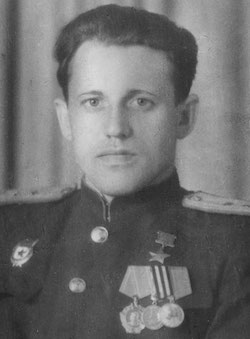
Nikolay Ivanovich Shchetinin was a Soviet Army lieutenant colonel and Hero of the Soviet Union. During the Battle of the Dnieper, Shchetinin was a senior lieutenant and was awarded the title Hero of the Soviet Union for his reported leadership of a company in capturing a village against numerically superior German forces.

Maxim Ivanovich Grabovenko was a Ukrainian Red Army senior sergeant and Hero of the Soviet Union. Grabovenko was awarded the title Hero of the Soviet Union and the Order of Lenin for his actions during the Battle of the Dnieper.
Garay Latif oglu Asadov was an Azerbaijani Red Army sergeant and a posthumous Hero of the Soviet Union. Asadov was posthumously awarded the title on 24 March 1945 for his actions during the Debrecen Offensive Operation. He was reported to have killed 16 German soldiers and was killed while covering a bunker opening with his body.

Pavel Nikolayevich Grudinin is a Russian politician and businessman. He served as a Municipal Deputy of the city settlement Vidnoye from 1997 to 2011 and Chairman of the Council of Deputies from 2017 to 2019.
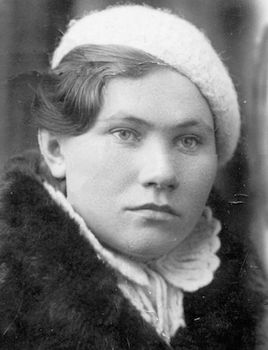
Nina Timofeevna Gnilitskaya was a soldier and reconnaissance scout in the 465th Separate Motorized Rifle Reconnaissance Company of the 383rd Rifle Division in the 18th Army on the Southern Front during World War II. After fighting to death in a gunfight against German soldiers when they discovered her hiding place she became the only woman reconnaissance scout in the Red Army to be awarded the title Hero of the Soviet Union after the Supreme Soviet posthumously awarded her the title on 31 March 1943.

Mariya Vladimirovna Melentyeva was a Soviet partisan from Karelia who was posthumously awarded the title Hero of the Soviet Union on 25 September 1943 for her resistance activities.
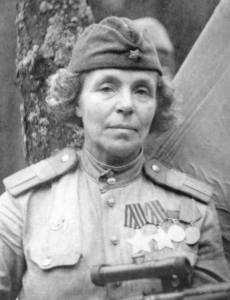
Nina Pavlovna Petrova was a Soviet sniper during the Winter War and World War II. She was credited with 122 kills by the Soviet government. She was posthumously awarded the Order of Glory 1st class on 29 June 1945, making her one of only four women to be awarded all three classes of the award.
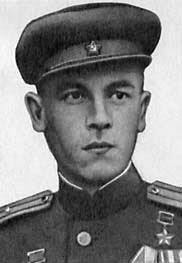
Vasily Nikolayevich Fedotov was a major general of the Soviet Army, who was awarded the title Hero of the Soviet Union for his actions in battle in the Second World War while he was a Lieutenant Colonel.
Abdulla Mahaevich Izhaev was a Karachay soldier in the Red Army during World War II. In 1995, he was posthumously awarded the title Hero of the Russian Federation; he had been nominated for the Order of Glory 1st class during the war, but did not receive it.
Alyona Vladimirovna Popova is a Russian human rights activist who is known for her digital campaign against domestic violence in Russia, and as one of the founders, together with Alexandra Mitroshina, of a social media flash mob with the catch phrase, "I did not want to die" (#ЯНеХотелаУмирать).

Nikolay Mikhailovich Podgornov, is a Russian former politician who had served as the 1st Governor of Vologda Oblast from 1991 to 1996.
Raïssa Vladimirovna Koublitskaïa was a Soviet Belarusian agricultural worker and politician who was the head of the cultivation of flax at the Kalinin collective farm from 1948 to her retirement in 1983. She served during the Great Patriotic War and was an elected deputy of the Supreme Soviet of the Byelorussian Soviet Socialist Republic between 1967 and 1971. Koublitskaïa was twice the recipient of the Order of Lenin and also received the Medal "For the Capture of Königsberg", the Order of the Patriotic War, 2nd class and the Hero of Socialist Labour.
Valentina Dmitrievna Dimitrieva was a Soviet Russian farm worker, production leader and politician who worked at the Motor Bolishebikshih collective farm from 1952 until her retirement in 1993 and was an elected deputy of the Congress of People's Deputies of the Soviet Union from the All-Union Organization of War and Labour Veterans between 1989 and 1991. She was one worker who began mechanisation of the farm she worked at to increase performance and raised productivity of the cows in her group by more than one-third in the early 1970s. Dimitrieva was decorated with the Medal "For Labour Valour"; the Order of the Red Banner of Labour; the Hero of Socialist Labour with the Order of Lenin and the "Hammer and Sickle" gold medal and the Medal "For Transforming the Non-Black Earth of the RSFSR".
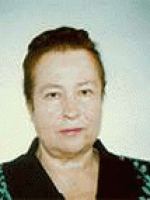
Alina Petrovna Vedmid was a Ukrainian politician and agronomist who was head of the "Zorya" collective farm in the Kyiv Oblast. She worked at the Peremoga collective farm in the Bohuslav Raion and was a laboratory assistant, technician-economist, engineer-economist at the Ukrainian Machine Testing Station. Vedmid was an economist and later chief economist of the collective farm "Dawn of Communism" in the Vasylkiv Raion. She was an elected deputy of the Supreme Soviet of the Ukrainian Soviet Socialist Republic that lasted from 1984 to 1989 and in the Congress of People's Deputies of the Soviet Union between 1989 and 1991 and in the third convocation of the Verkhovna Rada of Ukraine from 1998 to 2002. Vedmid was decorated with the Order of the Badge of Honour and the title of Hero of Socialist Labour with the Order of Lenin award and the "Hammer and Sickle" gold medal.
Lyubov Kyrylivna Vorona was a Ukrainian farm worker and politician. She worked as a senior zootechnician and livestock specialist in the Chkalov collective farm's Zhdanovsky and Polivanovsky sections. Vorona was secretary of the Novomayachkovsky District Committee of the Komsomol of Ukraine and led the collective farm "Gigant" from 1973 to 1977 as well as the reproductive complex of the collective farm "For the World" from 1990 to 1994. She was a deputy of both the ninth convocation of the Supreme Soviet of the Ukrainian Soviet Socialist Republic and the Dnipropetrovsk Oblast Council and was a member of the Central Committee of the Communist Party of Ukraine. Vorona was the recipient of various government awards such as the Order of Lenin and the Hero of Socialist Labour.












